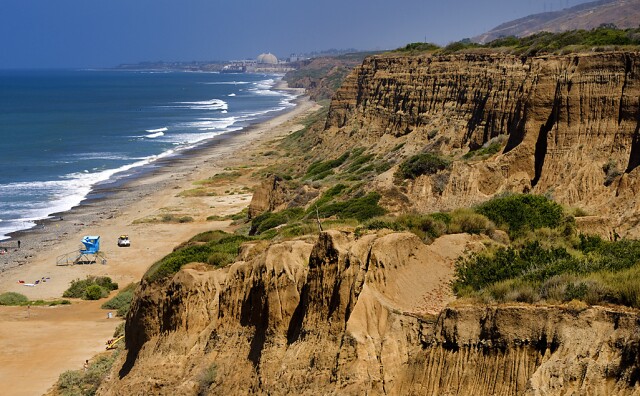This Heat Wave In LA Was So Bad, It Burned Leaves Off The Trees

In Northridge, marijuana plants wilted. Bright orange impatiens were sunburned and bleached white in Monrovia. In Anaheim, the leaves on an avocado tree turned brown and died.
Trees, flowers and even cacti are getting scorched by extreme heat across Southern California. Most of the recent damage happened after a heat wave broke temperature records across the region last month.
Record-breaking heat today - including daily records, a few for the month of July, and even a couple of all-time record highs. We will see a gradual cooling trend starting tomorrow. #LAheat #SoCal #CAwx pic.twitter.com/AT6eKSJ8Hf
— NWS Los Angeles (@NWSLosAngeles) July 7, 2018
It was enough to make comedian and Highland Park resident Marc Maron begin an episode of his podcastwith a rant:
"The trees are burning. Not from fire, but from a hot day!" he said. "I asked a gardener guy, I'm like, 'what's up with the trees?" He said, 'I'm pretty sure the sun just burned them.' Oh, is that all? The sun burned the trees? Is this unusual?"
WELL....IS IT?

Frank McDonough works at the L.A. County Arboretum, where lots of trees had crispy and brown leaves. He says it's not uncommon for individual trees to get scorched, but the extent of the damage around Southern California is definitely unusual.
He thinks the extended period of cool, overcast weather in late spring made things worse.
The plants "weren't ready for it, and when we did get the heat, it just threw them for a loop," he said.
Yes. My back yard is full of scorched camellias from the July inferno. It's like Descanso without the expert staff.
— beeswax (@realmissbeeswax) August 7, 2018
I took these pics during that 113 degree Friday, when the deer came to rest in our shade. pic.twitter.com/v21WZN9Kau
YOUR PLANT ON HEAT
Just like people, plants sweat to stay cool when it heats up (it's technically called transpiration).
Alexandra Pivovaroff, a visiting assistant professor at Whittier College who studies the effect of extreme heat on plants, says this works great to cool leaves down -- until plants don't have enough water to transpire.
"If they don't have the water to support this sweating, that's when they're in big danger," she said.
WHAT CAN I DO TO HELP THEM?
Yvonne Savio, who writes the Gardening in LA blog,recommends four things:
- Put plants in the shade or cover with a cloth
- Don't prune the dead leaves off!
- Don't fertilize them!
- Don't overwater them!
McDonough has an additional tip: painting trunks and large branches white, to help the tree reflect heat.

ENDLESS HEAT
Climate scientists say summer in LA might be one big heat wave in the future.
That's a scary thought, especially for plants. Unlike humans, they can't crank up the AC or turn on the sprinklers to cool off.
That means we may need to plant different kinds of trees and plants in the future, especially because many of SoCal's ornamental plants simply aren't adapted to this climate.
"There is a whole palate of trees that came with the people, because the nursery men got trees imported from the Midwest and they began selling them," said Greg McPherson, an urban forest researcher with the US Forest Service in Davis, told KPCC.
That makes them especially vulnerable to extreme heat.
Researchers with University of California Cooperative Extension are doing a 20-year long study to find out what to replace them with. Most of the species they're testing are from Australia, Arizona or New Mexico...because they're expecting L.A.'s climate to be a lot more desert-like in the future.
Have you been noticing changes in your neighborhood linked to the heat? Tell us about it below.
This story is part of Elemental: Covering Sustainability, a multimedia collaboration between Cronkite News, Arizona PBS, KJZZ, KPCC, Rocky Mountain PBS and PBS SoCal.
News happens every day. Here at LAist, our goal is to cover the stories that matter to you and the community you live in. Now that we're part of KPCC, those stories (including this one you're on right now!) are made possible by generous people like you. Independent, local journalism isn't cheap, but with your support we can keep delivering it. Donate now.
-
The severe lack of family friendly housing has millennial parents asking: Is leaving Southern California our only option?
-
As the March 5 primary draws closer, many of us have yet to vote and are looking for some help. We hope you start with our Voter Game Plan. Since we don't do recommendations, we've also put together a list of other popular voting guides.
-
The state's parks department is working with stakeholders, including the military, to rebuild the San Onofre road, but no timeline has been given.
-
Built in 1951, the glass-walled chapel is one of L.A.’s few national historic landmarks. This isn’t the first time it has been damaged by landslides.
-
The city passed a law against harassing renters in 2021. But tenant advocates say enforcement has been lacking.
-
After the luxury towers' developer did not respond to a request from the city to step in, the money will go to fence off the towers, provide security and remove graffiti on the towers.






